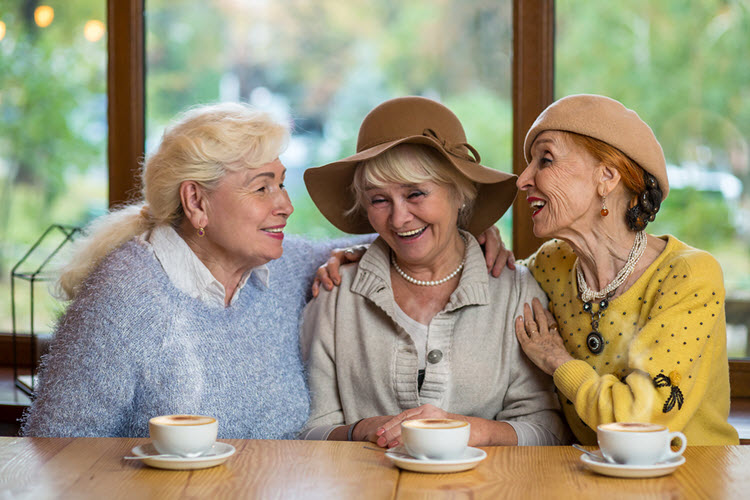The thing about old friends is not that they love you but they know you. Anna Quindlen, Lots of Candles, Plenty of Cake.
I love this quote from Anna Quindlen. I am fortunate to have friends that have been a part of my life for over 40 years. Not only do they know me in all my craziness and still love me, but they knew my parents as well.
The perspective they brought to my caregiving years because they knew my parents and me was invaluable. When I was frustrated, sad, stressed and feeling like I couldn’t do this anymore, our conversations gave me insight and the ability to go on. They helped me to see where things from my childhood might be getting in the way. They helped me see that my mother was always stubborn and opinionated, so why would I think at 80+ years it would be any different? And they reminded me that I was indeed doing the best I could even if it didn’t feel like it today.
Old friends and our shared history remind us of who we are. This shared history brings context to so many stressful situations. For better or for worse, they understand who we are now since they know everything about our family and understand the nuances of our relationships.
Old friends are like family but there is not the same pressure that family dynamics can bring to the caregiving experience. They are often the people who are most likely to be honest with you. They might not tell you what you want to hear, but they will tell you what you need to hear, which was something I needed desperately when my inner eight-year-old would rear her ugly head. And because they understood the nuances of my family, they could appreciate the complexity of the changing relationship with my mother.
As women, we know how important girlfriends are to our health and well-being. It is often a topic of discussion when a group of women get together. Because of the importance of these relationships, I have gone to see many movies based on the bonds of girlfriends, dissecting the story line over drinks and a meal afterwards.
New friends are important and nourish us as well. They don’t have history with us, but as we grow older, we have a better sense of ourselves and what we like, so we tend to meet people who have similar interests. During caregiving, making friends who are in the same situation can enrich your life, help you keep going when times are tough and validate your feelings without trying to fix it for you. Sometimes, we just need someone to sit in the mud with us.
Old friends and new are important to our health as caregivers. One study published in the Annals of Behavioral Health found that people who discussed difficult times in their lives had a lower pulse and blood pressure when they had a friend by their side. Friends give us that shoulder to lean on and ear to listen, which increases our sense of belonging and reduces stress and anxiety.
Women have an advantage over men in this area. Men, especially spousal caregivers of a certain age, do not have the same network of friends, nor do they talk about what is going on in their lives in the same way as women. Bill Cohen’s mother had Alzheimer’s and Bill was her caregiver. He decided to attend an Alzheimer’s support group and realized the need for emotional and physical support. Since the mid-2000s, male caregivers have increased to 1 in 3 and the need for places to find support is increasing as well. To that end, Bill runs a Facebook support group, Dementia Support Group for Caregivers with Bill Cohen. It is a place for all caregivers, but male caregivers who do not have old and new friends to support them may fine it particularly helpful.
I know caregiving takes up so much energy that it is easy to let relationships fade away. Keeping up with old friends and making new ones can be overwhelming during this journey. But I will remind you of something Denise Brown from The Caregiving Years Training Academy says, “You have a right to a life during caregiving.” Part of keeping a life, I would argue one of the most important parts, is making time for old and new friends, in whatever way works best for you. It is the emotional support and non-judgmental perspective old and new friends can give us that, as Anne Tumlinson says, “You just may survive this experience.”
Disclaimer: The material in this blog is for educational purposes only. It is not intended to replace, nor does it replace, consulting with a physician, lawyer, accountant, financial planner or other qualified professional.
Deb is the author of “Your Caregiver Relationship Contract and “A Relationship Contract for Dementia Caregivers.” Your Caregiver Relationship Contract is available in both English and Spanish. It explains how to have an intentional conversation and the how unspoken expectations can cause problems during caregiving. A Relationship Contract for Dementia Caregivers explains how important it is to learn how your person wants to live their life out and how you, the caregiver are the most important person in this relationship, giving you tips and tricks for this journey.
Click here to learn more about Your Caregiver Relationship Contract or here for the Spanish version: Su Contrato de relación como cuidador de un ser querido. Click here to learn more about A Relationship Contract for Dementia Caregivers.
Deb is available as a caregiver consultant. She will answer the question: “Where do I start?” and find the resources to alleviate your stress. If you would like to invest a half hour to learn how she can help you, please contact her at: Free 30 minute consulting call

